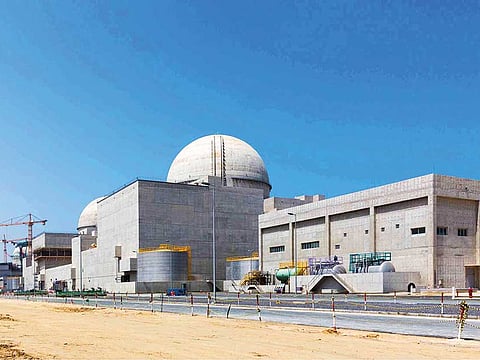UAE’s nuclear energy programme remains on track
Federal authority releases 2017 report that shows 85% licences for Units 1 and 2 reactors have been approved

Abu Dhabi: The UAE’s journey towards a peaceful nuclear energy programme remains on course, according to the Federal Authority for Nuclear Regulation’s (FANR) annual report for 2017, which showed that 85 per cent of the operating licences for Units 1 and 2 reactors at the Barakah Nuclear Power Plant had been approved.
The report, released on Wednesday, showed that the authority’s total expenditure for 2017 amounted to Dh273,905,152, down from the previous year’s spending of Dh282 million. Safety continued to be the main priority for the authority with Dh52 million going towards its Nuclear Safety Department, and another Dh39 million to its Radiation Safety Department.
“In 2017, the FANR announced its five-year strategic goals to ensure the peaceful, safe and secure use of nuclear energy and radiation sources as well as the sustainability of the UAE’s regulatory infrastructure. As the country moves rapidly forward with developing its nuclear sector, the FANR has made notable progress in 2017 in terms of honouring the UAE’s commitments under the 2008 Policy of the UAE on the Evaluation and Potential Development of Peaceful Nuclear Energy,” said FANR chairman Abdullah Nasser Al Suwaidi in the report.
“The year 2017 also marked the 41st anniversary since the UAE joined the International Atomic Energy Agency (IAEA) and started a successful partnership of cooperation. This ongoing cooperation enables FANR to ensure world-class safety standards and international best practices with regard to nuclear regulation,” he added.
Al Suwaidi said the UAE remained committed towards having a transparent and peaceful nuclear energy programme, with the country regularly providing the IAEA and all relevant international bodies with reports on the country’s nuclear programme.
“The FANR continued in its mission to honour the UAE’s commitments in the development of peaceful nuclear energy. In March 2017, the UAE presented its third national report at the seventh review meeting of the contracting parties to the Convention on Nuclear Safety. The meeting reviewed the report and concluded that the UAE fulfilled all its obligations as per the convention which it adhered to in 2009.
“In October 2017, the UAE submitted its third national report to the IAEA as part of the UAE’s participation in the sixth review meeting of the contracting parties to the Joint Convention on the Safety of Spent Fuel Management and on the Safety of Radioactive Waste Management, which is scheduled to take place in May 2018,” he added.
The annual report highlighted the authority’s diligent inspections throughout the year, with 55 routine inspections carried out on companies across the country to ensure their adherence to the nuclear related safety guidelines. The authority also conducted over 40 inspections at the Barakah Nuclear Power Plant to verify the nuclear power plant’s operational readiness and its security safeguards.
Radiation inspections were also carried out by the authority throughout 2017 with 379 completed by its radiation inspectors.
In terms of licences issued, the authority approved 262 licences in 2017, with the majority related to the medical sector for activities such as medical diagnostics, radiotherapy and dental X-ray.
Emiratisation
The authority’s 2017 report also highlighted positive numbers for its Emiratisation drive, with 64 per cent of its 222 workforce consisting of Emiratis. The report said 20 Emiratis were recruited in 2017, as the organisation looks to continue its capacity building with a cadre of home-grown talent.
“The FANR remains dedicated to developing Emiratis in the nuclear sector, and this forms part of its capacity-building and sustainability efforts. In 2017, the FANR’s total workforce was 222 employees, 64 per cent of which are Emirati. In the past year, 17 Emiratis also graduated from FANR’s flagship training and development programme, the Developee Engineers Programme. This reflects FANR’s dedication to the long-term development of Emirati expertise in the nuclear regulatory sector,” said Christer Viktorsson, FANR director-general.



